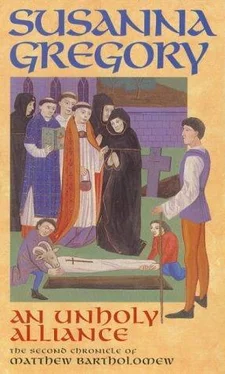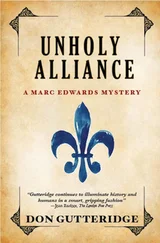Susanna Gregory - An Unholy Alliance
Здесь есть возможность читать онлайн «Susanna Gregory - An Unholy Alliance» весь текст электронной книги совершенно бесплатно (целиком полную версию без сокращений). В некоторых случаях можно слушать аудио, скачать через торрент в формате fb2 и присутствует краткое содержание. Жанр: Исторический детектив, на английском языке. Описание произведения, (предисловие) а так же отзывы посетителей доступны на портале библиотеки ЛибКат.
- Название:An Unholy Alliance
- Автор:
- Жанр:
- Год:неизвестен
- ISBN:нет данных
- Рейтинг книги:3 / 5. Голосов: 1
-
Избранное:Добавить в избранное
- Отзывы:
-
Ваша оценка:
- 60
- 1
- 2
- 3
- 4
- 5
An Unholy Alliance: краткое содержание, описание и аннотация
Предлагаем к чтению аннотацию, описание, краткое содержание или предисловие (зависит от того, что написал сам автор книги «An Unholy Alliance»). Если вы не нашли необходимую информацию о книге — напишите в комментариях, мы постараемся отыскать её.
An Unholy Alliance — читать онлайн бесплатно полную книгу (весь текст) целиком
Ниже представлен текст книги, разбитый по страницам. Система сохранения места последней прочитанной страницы, позволяет с удобством читать онлайн бесплатно книгу «An Unholy Alliance», без необходимости каждый раз заново искать на чём Вы остановились. Поставьте закладку, и сможете в любой момент перейти на страницу, на которой закончили чтение.
Интервал:
Закладка:
After, they would go back to Michaelhouse for breakfast, and lectures would start at six.
The sky was beginning to lighten in the east, and although there were sounds — a dog barking, a bird singing in the distance, the clatter of an early cart to the market — the town was peaceful, and this was Bartholomew's favourite time of day. As Michael fumbled with the large church key, Bartholomew walked over the long grass of the churchyard to a small hump marked with a crude wooden cross. Bartholomew and Michael had buried Father Aelfrith here when, all over the city, others were being interred in huge pits at the height of the plague. He stared down at the cross, remembering the events of the winter of 1348, when the plague had raged and a murderer had struck at Michaelhouse.
Bartholomew had buried another colleague in the churchyard too. The smug Master Wilson lay in his temporary grave awaiting the day when Bartholomew fulfilled a deathbed promise and organised the construction of an extravagant tomb carve'd in black marble. Bartholomew felt a deep unease about the notion of removing Wilson's body from its grave in the churchyard to the church. Even after a year and a half of rethinking all he had learned, Bartholomew still did not understand how the plague spread, or why it struck some people and not others.
Some physicians believed the stories from the East, that the pestilence had come because an earthquake had opened the graves of the dead. Bartholomew saw no evidence to prove this was true, but the plague was never far from his thoughts, and he was loathe to risk exhuming Wilson.
He heard Brother Michael begin to chant and dragged himself from his thoughts to go about his duty. Faint light filtered through the clear glass of the east window, although the church was still shades of grey and black.
Later, when the sun rose, the light would fall on the vivid paintings on the walls that brought them alive with colour. Especially fine was the painting that depicted Judgement Day, showing souls being tossed into the pits of hell by a goat-devil. On the opposite side St Michael saved an occasional soul. Bartholomew often wondered what had driven the artist to clothe the Devil in a scholar's tabard.
As Michael continued to chant, Bartholomew opened the small sanctuary cupboard, took out chalice and.paten, and turned the pages of the huge Bible to the reading for the day. When he had finished, he walked around the church lighting candles and setting out stools for those of the small congregation who were unable to stand.
As he checked the level of holy water in the stoup, he grimaced with distaste at the film of scum that had accumulated. Glancing quickly down the aisle to make sure Michael was not watching, he siphoned the old water off into a jug, gave the stoup a quick wipe round, and refilled it. Keeping his back to Michael, Bartholomew poured the old water away in the piscina next to the altar, careful not to spill any. There were increasing rumours that witchcraft was on the increase in England because of the shortage of clergy after the plague, and there was a danger of holy water being stolen for use in black magic rituals. The piscina ensured that the water drained into the church foundations and could not be collected and sold. But Bartholomew, as a practising physician, as well as Michaelhouse's teacher of medicine, was more concerned that scholars would touch the filthy water to their lips and become ill.
Michael finished his prayers and Bartholomew saw him sneak a gulp of wine from the jug intended for the mass. The monk yawned hugely, and began to relate a tale of how a pardoner had tried to sell him some of the Archangel Gabriel's hair at the Fair the previous day. Michael, outraged, had demanded proof that the hair had indeed belonged to Gabriel and had been informed that the angel himself had presented it to the pardoner in a dream. Michael proudly announced that he had tipped the scoundrel and his fake hair into the King's Ditch. Bartholomew winced. The Ditch was a foul affair, running thick with all kinds of filth and waste, and Michael's righteous anger might well have caused the unfortunate pardoner to contract a veritable host of diseases.
Before he could respond, the doors were pushed open and sleepy-eyed scholars began to file silently into church. Michael and Bartholomew shot to the altar rail and knelt quickly in the hope that they had not been seen chattering when they should have been praying.
Bartholomew watched the Michaelhouse scholars take their places in the choir: the Fellows in a line to the right headed by the Master, and the students and commoners behind. Cynric ap Huwydd, Bartholomew's book-bearer, rang the bell to announce that the service was about to begin. The scholars of Physwick Hostel, who had begged use of St Michael's Church from Michaelhouse because their own church had been closed since the plague, processed in and stood in a neat line opposite the Michaelhouse scholars. The arrangement was an uneasy one: Physwick resented being forced to rely on Michaelhouse's good graces, and Michaelhouse was nervous at sharing the church after twenty-five years.
Bartholomew saw Physwick's Principal, Richard Harling, exchange a smile far from warm with Michaelhouse's Senior Fellow, Roger Alcote.
In the main body of the church a few parishioners drifted in, yawning and rubbing the sleep from their eyes, and Michael began the service, his rich baritone filling the church as he chanted. Out of the corner of his eye, Bartholomew saw something fly through the air towards the Michaelhouse students. It landed harmlessly, but a stain on the floor attested that it was a ball of mud.
Bartholomew scanned the congregation, and identified the culprits in the form of the blacksmith's sons. They stood, hands clasped in front of them, eyes raised to the carved wooden roof, as though nothing had happened.
Bartholomew frowned. The University had a stormy relationship with the town, and, although the University brought prosperity to a number of townsfolk, it also brought gangs of arrogant, noisy students who despised the people of the town and rioted at the least provocation.
Bartholomew saw one of the Physwick students bow his head in laughter at the mud-ball. The University was not even at peace with itself: students from the south loathed scholars from the north and from Scotland; they all hated students from Wales and Ireland; and there was even fierce rivalry between the different religious orders, the mendicant friars and priests at loggerheads with the rich Benedictines and the Austin Canons who ran the Hospital of St John.
Bartholomew turned his attention away from the blacksmith's loutish sons, and back to the service.
Michael had finished reading, and the scholars began to chant a Psalm. Bartholomew joined in the singing, relishing how the chanting echoed through the church.
As the Psalm finished, Bartholomew stepped forward to read the designated tract from the Old Testament.
He faltered as the door was flung open, and a man walked quickly down the aisle, gesturing urgently that he wanted to speak to the Master, Thomas Kenyngham.
Kenyngham was a gentle Gilbertine friar whose rule of the College was tolerant to the point of laxity. He smiled benignly and waved the messenger forward. The man whispered in his ear, and Bartholomew saw Roger Alcote surreptitiously lean to one side to try to overhear.
The Master favoured Alcote with a seraphic smile until Alcote had the grace to move away. Out of the corner of his eye, Bartholomew saw that one of the clerk's frenzied gestures was directed towards him, and wondered which of his patients needed him so urgently that mass could be interrupted.
Kenyngham left his place and walked towards the altar, laying a hand on Bartholomew's arm to stop his reading.
'Gentlemen,' he began in his soft voice, 'there has been an incident in St Mary's Church. The Chancellor has requested that Brother Michael and Doctor Bartholomew attend as soon as possible. Father William and I will continue the mass.' Without further ado, he took up the reading where Bartholomew had stopped, leaving William to scramble to take his own place. Michael dropped his prayerful attitude with a speed that verged on the sacrilegious and made his way down the aisle, eyes gleaming with anticipation. Cynric followed, and Bartholomew went after them, aware of the curious looks from the other scholars. The Master of Physwick plucked at his sleeve as he passed.
Читать дальшеИнтервал:
Закладка:
Похожие книги на «An Unholy Alliance»
Представляем Вашему вниманию похожие книги на «An Unholy Alliance» списком для выбора. Мы отобрали схожую по названию и смыслу литературу в надежде предоставить читателям больше вариантов отыскать новые, интересные, ещё непрочитанные произведения.
Обсуждение, отзывы о книге «An Unholy Alliance» и просто собственные мнения читателей. Оставьте ваши комментарии, напишите, что Вы думаете о произведении, его смысле или главных героях. Укажите что конкретно понравилось, а что нет, и почему Вы так считаете.












